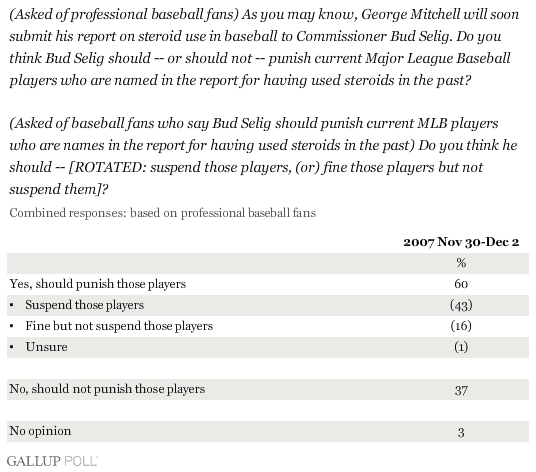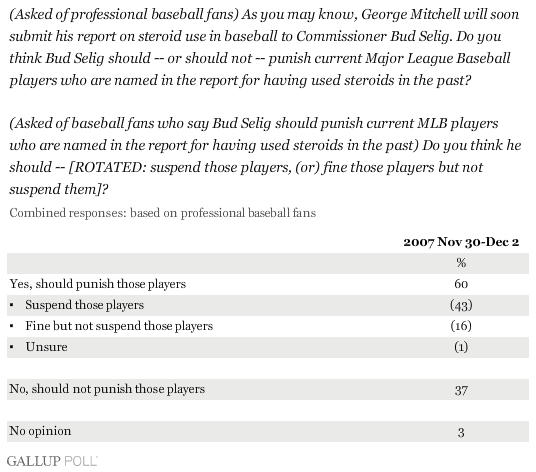PRINCETON, NJ -- On Thursday, former Sen. George Mitchell released the results of his investigation into the use of performance-enhancing drugs in Major League Baseball. The report identified dozens of current and former players -- including some of the game's biggest stars like Roger Clemens, Andy Pettitte, and Miguel Tejada -- for using steroids or other performance-enhancing drugs during their careers.
A USA Today/║┌┴¤═° poll conducted in late November and early December, before the report's findings were publicized, shows that most baseball fans believe Major League Baseball Commissioner Bud Selig should punish current players who are named in the report as having used steroids. Those who advocate punishment are more likely to support suspensions rather than merely fines for these players. Baseball fans are skeptical that steroid use among baseball players is down today compared with five years ago -- the majority say steroid use has either increased or remained at the same level it was at five years ago, with about one in three saying it has decreased.
Among Americans who identify themselves as baseball fans, 60% say Selig should punish current Major League Baseball players who are named in the report as having used steroids in the past, including 43% who favor suspensions for those players and 16% who favor fines but not suspensions. Thirty-seven percent believe Major League Baseball should not punish players named in the report.

Baseball fans do not think the steps Major League Baseball has taken in recent years to squelch the use of steroids and other performance-enhancing drugs in the sport have been overly effective. When asked if the number of players who use performance-enhancing drugs has increased, stayed the same, or decreased compared with five years ago, 40% say that number has increased (including 23% who say it has increased a lot), while 27% say it has stayed the same, and 31% say it has decreased. That amounts to 67% of fans who think steroid use is either at the same level it was at five years ago, or has gone up since then.

Survey Methods
Results are based on telephone interviews with 1,006 national adults, aged 18 and older, conducted Nov. 30-Dec. 2, 2007. For results based on the total sample of national adults, one can say with 95% confidence that the maximum margin of sampling error is ┬▒3 percentage points.
For results based on the sample of 413 professional baseball fans, the maximum margin of sampling error is ┬▒5 percentage points.
In addition to sampling error, question wording and practical difficulties in conducting surveys can introduce error or bias into the findings of public opinion polls.
